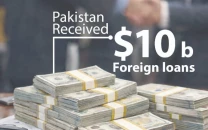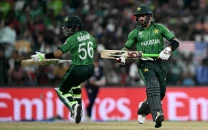Floods, aftermath and way forward
Visitations to flood-affected areas without thorough planning, preparation and coordination be avoided

It was a weekend Saturday in 2013. I was going through the routine ‘mail’ in my official residence in Hyderabad Cantt. Glancing through the newspaper clippings that my staff meticulously compiled for me to glean the ‘pulse’, I was alarmed by the recurring news of food shortages, infant mortality and malnutrition in greater Thar, my Division’s area of responsibility. I called for a helicopter and flew the same day, landing at Mithi, Nagar Parker, Diplo and Chachro to assess the situation. On return, I briefed my Corps Commander in Karachi about the almost famine-like situation, created by the worst drought, crops failure and consequent malnutrition causing deaths especially among babies and livestock.
We flew together on Sunday, and the same night, I moved troops in the greater Thar area to establish field hospital in Mithi, medical posts elsewhere and a logistic chain for sustained supply of medical aid, grain and other foodstuff to the distressed in their goths — villages. The PPP-led Sindh government led by Jamaat Ali Shah had goofed up big time, and the ire of Prime Minister Nawaz Sharif was evident, when he visited the area on Monday. Sindh’s who-is-who for the photo-op included Bilawal Bhutto, Sharjeel Memon, Marvi Memon and Shazia Mari, as I remember. We in the Army consciously stayed away from the sumptuous lunch arranged for the PM that somehow did not fit well with the hunger around us.
For the next over two months, my Formation provided the much-needed medical aid, water, food, grain and baby-specific products to the hapless people of Thar (Tharis), comprising largely Hindu Pakistanis. The Formation deployed a well-chalked out logistic plan, using roads, helicopters, porters and tractor trollies. Dividing the area in sectors and working round the clock, we made at least two ‘revisits’ to each and every goth in Thar, after providing immediate relief. The staff was also coordinating donation collection in cash and kind, its accounting and disbursement.
Following the R4 Strategy (Rescue, Relief, Rehabilitation and Reconstruction) much resource was set aside for ‘Rehabilitation’, after initial but crucial ‘Rescue and Relief’ (R2). Rehabilitation Phase continued to include sustainable development of wells, installing Reverse Osmosis (RO) plants, recharging government-owned grain stockpiles and continued medical support incorporating volunteer doctors from all over Pakistan.
The same Division (Desert Hawks) was also at the forefront of flood relief in 2010. The engineering equipment, boats, de-watering pumps, ropes, emergency rations and medical equipment, including a complete field hospital in reserve, were over and above the Division’s own compliment, and maintained for the purpose. This equipment may still be needed till the present flood reaches Indus Delta in Thatta area.
The Plan was implemented like a clockwork, thanks to my staff and troops. Its success was pleasantly acknowledged, when a delegation of abadgaars — settlers with large land holdings — during their visit apprised me that Army had provisioned Tharis so well, that that there was no farm labour available for their wheat harvest that year. Tharis were traditionally the seasonal work force for abadgaars.
While a follow-up piece would discuss the strategy for Pakistan to fight natural disasters owing to climate change, this piece focuses more on functional aspects of flood relief, whose full-scale impact is yet to unfold.
First, the political environment. It was heartening to hear the very conciliatory press interaction by PML-N’s Saad Rafique recently, emphasising bipartisan response to the calamity. However, blocking international credit card transaction during ex-PM Imran Khan’s recent telethon fund-raiser was despicable. This is a national emergency warranting a whole-of-nation response, and not a time for politics. Setting aside vendettas, both sides need to work in unison. In our ‘one-incident political culture’, lackluster response on-ground by Federal Government and/or PTI in KP, Punjab, GB and AJK can cost dearly in political terms. IK/PTI’s parallel relief mechanism may or may not work, as unity of effort is a proven reality in such situations. Disorganised response to disaster is itself a disaster.
Second, although NDMA/PDMAs provide the requisite organisational structure but their actual on-ground performance in rescue/relief raises questions. Other than reporting and compiling data, these organisations seem more suited to rehabilitation work. For the current and immediate phase, the PDM government has instituted a ‘Flood Coordination Response Centre’ rather than resuscitating PTI’s NCOC, which could have been a better model given the NCOC’s proven credentials to handle Covid-19. However, such national level body created with focused urgency normally does well, compared to a bureaucratically-entrenched NDMA/PDMAs, that is short on resources during R2.
Third, control of corruption in government, favoritism and unscrupulous elements taking advantage of disaster through theft, pilferage and outright deceit are vital. Confusion about Army’s Flood Relief account for donations initially encouraged swindlers to propagate many fake accounts over social media, fleecing gullible people. To obviate this, the PM/President Secretariat, Military and other organisations should have permanent accounts for donation collection, well publicised over respective websites. Most credible NGOs like Al-Khidmat have elaborate online mechanisms to choose and donate. Meanwhile FIA Cyber Crime Wing should trace/arrest swindlers.
Mushrooming relief agencies, some with dubious credentials, should have ‘some’ official oversight, control/ratification etc. Without stifling initiative, such specifically-purposed entities be asked to ensure audit of their proceeds. Their registration should be a subsequent follow-up action under NDMA.
Fourth, as a principle, individuals/entities intending to help in R2 should do so without creating hindrance for relief providers. Doing relief work without experience and preparation can be counterproductive especially in ‘Rescue’ Phase, which is professional and specialized work. Yes, identifying local vulnerabilities to the concerned officials is always helpful.
Visitations to flood-affected areas without thorough planning, preparation and coordination be avoided. Transportation in affected areas is costly and dangerous. Creating bottlenecks through congestion and accidents is unhelpful. Government agencies be consulted for road condition/clearance, if planning the adventure.
Fifth, collection itself be focused and targeted with stipulated donation categories. Cash donations are best/flexible. Initial donations in kind be restricted mainly to foodstuff and water after prior coordination with relief agencies to avoid unnecessary duplication. For clothing and blankets etc, only usable items be donated rather than torn, soiled and dirty domestic surplus. Dignity and emotional state of recipients be kept in mind.
Meat and cooked food are not very helpful given their time-sensitive distribution and potential to add waste and filth near flood victims, if rotten/spoiled. Dry foods (biscuits, baby foods, energy bars, gurr (jaggery), channa (roasted gram) instead are best immediate foods, given their shelf-life. Rice, pulses, cooking oil, tea/sugar and dried milk are better in the medium-term. Items should be securely packaged for ease of transportation and distribution. After initial provision of bottled water during rescue, emphasis be on providing water purification tablets, portable water filters and purification materials/devices. This will reduce subsequent dependence besides solid waste.
Relief camps be urgently provided with chemical toilets especially for ladies, marshalling all resources on priority. Unnecessary visitations to the affectees for social/personal/political point-scoring be curbed. (To be continued)
Published in The Express Tribune, September 1st, 2022.
Like Opinion & Editorial on Facebook, follow @ETOpEd on Twitter to receive all updates on all our daily pieces.












COMMENTS
Comments are moderated and generally will be posted if they are on-topic and not abusive.
For more information, please see our Comments FAQ